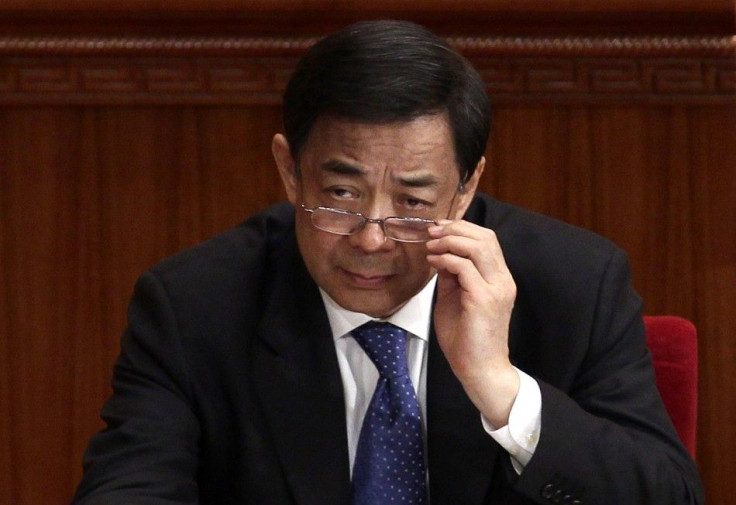Bo Xilai Fired: What His Downfall Means For China

Bo Xilai has been sacked from his position as the Communist Party Chief of Chongqing, revealed the Central Committee of the Communist Party of China on Thursday. The state-owned Xinhua News Agency's coverage of the event was brief and unceremonious, belying its critical significance.
Though Bo may yet retain his position with the Politburo in Beijing, it is clear that the politician has fallen out of favor with the ruling elites and is no longer in the running for a spot on the Politburo's nine-person Standing Committee, the most powerful political cadre in the country. Seven members of the committee, including current President Hu Jintao, will be replaced in October.
Bo's sudden departure shocked his Chongqing supporters. He was aggressively populist, well-liked by much of the public, and savvy about endearing himself to the local media. It certainly didn't hurt that he was also considered charming, charismatic and good-looking.
But in this build-up to October's power shift, Bo has made plenty of enemies.
In his position as the political leader of the sprawling metropolis of Chongqing, Bo rejected the reformist brand of Communism practiced by President Hu and his allies. He took a hard line against market liberalization and political corruption, condemning the yawning income gap between urban elites and the rural poor.
Instead, he advocated a return to a stronger kind of communism, complete with revolutionary nostalgia and heavy-handed socialist reforms. He is known in Chongqing for popularizing red songs and Maoist folklore, and for large government projects aimed at helping the low and middle classes, including a large-scale affordable housing initiative.
But Bo is perhaps best known for his ruthless efforts to squash organized crime in Chongqing. He and his right-hand man, Police Chief Wang Lijun, went after wealthy business owners who allegedly engaged in corruption and organized crime.
The public generally supported Bo for his crime-cutting, egalitarian politics, and Chongqing today is a growing and well-functioning metropolis. But some onlookers were far from convinced.
On March 4, one of the businessmen targeted by Bo and Wang came forward to offer his own side of the story. Still on the run, he spoke to Financial Times from an undisclosed location.
The billionaire, Li Jun, reports being arrested and tortured. His assets were seized and his family was detained. But in the end, the government could present no solid evidence of any wrongdoing.
The Chongqing model is nothing but a new red terror in which Bo Xilai and Wang Lijun trampled on the law and human rights, attacked their political enemies and took whatever they wanted in order to enhance their power, he said.
Another target, journalist Jiang Weiping, was sentenced to eight years in prison by Bo's forces. His only offense, said Financial Times, was writing three censorious articles. China is now at a historic crossroads, he said. Either it turns toward political reform... or it returns to a new cultural revolution, as Bo Xilia would like. If Bo wins and China turns back, that would be a disaster for the country and the world.
Things started falling apart for Bo when Wang, his protégé, became the center of a national scandal. Recently demoted by Bo and possibly under investigation for his work targeting China's elite, Wang apparently feared for his life and fled Chongqing for the American consulate in nearby Chengdu. He spent a day with U.S. officials, where it's quite possible he revealed sensitive information. Afterward, he was detained by the Chinese government in Beijing.
Bo's public image suffered in the wake of the incident. Another blow came on Wednesday, according to BBC, when Chinese Premier Wen Jiabao publicly chided Bo's politics without mentioning the party leader by name. Wen hinted at his distaste for red politics, adding that Wang's defection was a cautionary tale.
The present Chongqing municipal party committee and the municipal government must reflect seriously and learn from the Wang Lijun incident, he said.
One day later, on the ides of March, the news dropped that Bo Xilai had been relieved of his duties as the party leader of Chongqing.
For China, this is a vital shake-up. The people who make up the next Politburo Standing Committee will decide the future of the world's second largest economy, and all signs point to worsening friction between incumbent reformists and ambitious Maoists.
The state-controlled media hopes to frame the upcoming transition as one without conflict. But below the surface, Chinese politics are undergoing a tectonic shift, and events like the sacking of Bo and the defection of Wang are visible fissures.
© Copyright IBTimes 2024. All rights reserved.






















